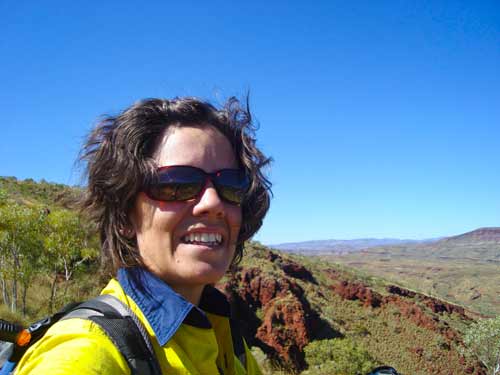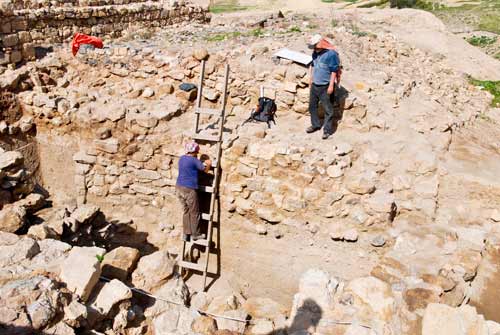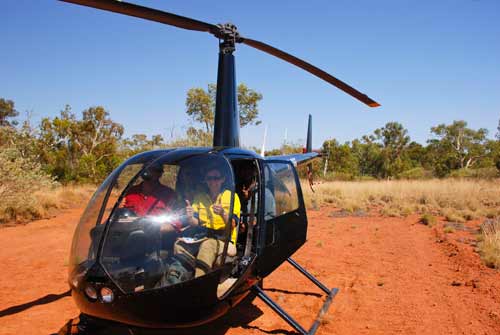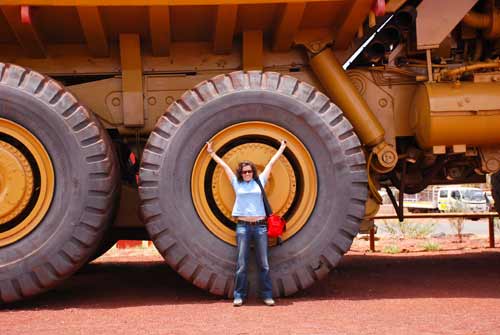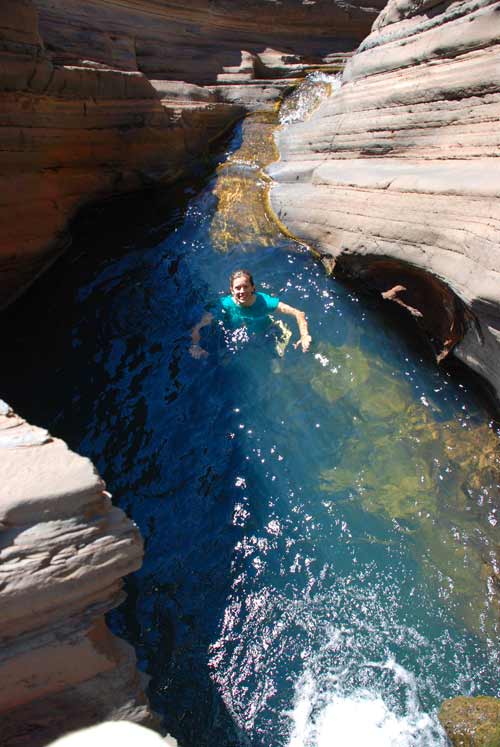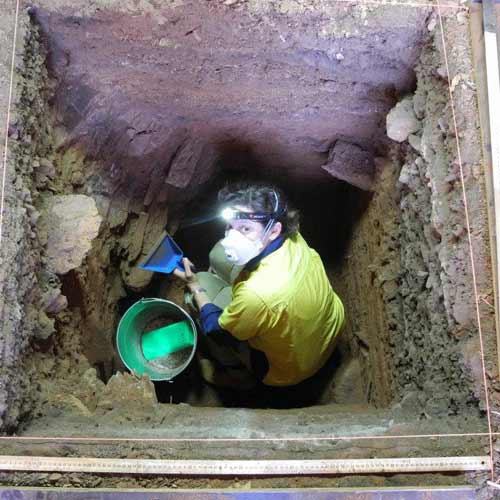Guadalupe Cincunegui – consulting archaeologist
Why do you think archaeology is important?
Archaeology is at its most basic is a look into the lives of others; how they lived, what they did in their day-to-day lives, how they made new discoveries etc. Archaeology helps us to understand how humanity and societies have developed and hopefully it also helps us understand the present a little better.
When did you know you wanted to be an archaeologist, and what was it that made you want to be one?
It’s a terrible cliché, but when I was around eight years old I watched a documentary about the early Egyptians and the pyramids. I remember lying on the floor on my belly and rolling around to tell my parents that I was going to be an archaeologist. My parents probably rolled their eyes, but my mother loyally took me to the local library week after week to borrow books on ancient civilisations for years after that day. At high-school, I put an ancient “spin” on anything I could, to the point that I remember asking my geography teacher whether I could write a class assignment about natural disasters on Vesuvius and Pompeii!
When it was time to select my university courses my parents sat me down and told me that it was ok if I didn’t want to be an archaeologist, no one expected me to do it just because I’d said I was going to be one when I was eight. I think no one (including me) knew how I was ever going to make a living from being an archaeologist, but I was sure that if I liked it enough, work would follow!
What study did you do to become an archaeologist?
I did a Bachelor of Arts for (Honours) with a double major in Near Eastern and Prehistory/Historic Archaeology. I signed up for every possible archaeology course I could take and when that was limited to a certain number of units I took Ancient History and Early Modern European History as well!
After finishing my honours, I took a year off to travel and see some of the sites that I had been studying about in Greece, Italy, South America, Spain and France. I also had the opportunity to travel and work on an Iron Age Site in the United Arab Emirates as part of a University of Sydney excavation team. Working on this site gave me a taste of how competitive archaeology could be and for the first time I seriously doubted whether I should have chosen another career path.
When I returned to Australia, I enrolled in a Masters Degree in Curatorial/Museum Studies at the University of Sydney. Looking back, I think I was trying to find if I could take my love of ancient history to a more practical level. I have to say looking back, I was rather disillusioned and it was the first time I questioned why I had studied archaeology in the first place.
How long have you been an archaeologist?
I have been studying archaeology more or less continuously since 1997 and I have been working as a consulting archaeologist since 2000.
What are some of the key jobs you’ve had?
Unlike today when the mining boom has created a huge number of heritage and archaeology jobs, finding work as an archaeologist when I entered the workforce was highly competitive. As a result, I had to volunteer for quite a while before I was able to secure any paid work, at best if you were lucky you were selected as an unpaid volunteer to clean artefacts and excavate post holes. In the meantime to pay the bills I worked as a receptionist to a plastic surgeon, behind the counter at a petrol station and as one of the education officers at the Nicholson Museum.
One of my first paid jobs as an archaeologist was “dig pig” or “shovel monkey” at the site of Broadway. This meant that I was another body on the ground, but skilled enough to do whatever I was told! The work was incredibly hard and I remember at one point we were working 12 hour days 7 days a week. We worked in the sun, we worked in the rain, people got sick, but it was so much fun. I remember feeling that perhaps I’d been too hasty…this archaeology business wasn’t son bad! It helped that at this job I received my first decent paycheck. I remember taking it to the bank to deposit it and getting a photocopy of the cheque first, I couldn’t believe how much money it was and that I was finally earning a living as an archaeologist! I still have a copy of that cheque in a book somewhere.
Since then, I have been fortunate enough to work on a number of projects in Jordan and to be employed fulltime as an archaeologist/ heritage consultant for a number of firms across Australia. I am currently the Cultural Heritage Manager at a firm based in South Australia where I manage multi-disciplinary project teams conducting large, complex cultural heritage projects for infrastructure, mining and major urban planning and development around Australia.
What’s your realistic and/or dream hope of archaeological achievement?
I think when I started out in archaeology; I had a different set of expectations regarding my achievement and where I would one day end up. I thought the only way to make it was to do a PhD and then venture into academia. Now I just appreciate what amazing heritage we have right here in Australia and how often it is overlooked and undervalued. If I can make some kind of contribution to understanding the history of Australia, or at very least help to protect a site or record information from a site that will help someone else make this contribution, then that would make me very happy.
What are some words you would use to describe your experience as an archaeologist?
Archaeology is exhausting, fun, rewarding, and political, it’s dirty and tiring and it will make you want to cry but it will equally make you want to laugh out loud. At the end of the day though, there aren’t many jobs where your state of filth will guarantee you a seat on the bus at the end of a days, nor silence a dinner party crowd when someone asks what you do….well, maybe if you were an astronaut?
Is there anything else you would like to share with our readers?
Don’t tell me about some new dinosaur discovery, or about your aunt’s theories on how the aliens built the pyramids. I really don’t care!
Which parts of your job do you love, like, not so much….?
Dealing with daily misconceptions about what an archaeologist does can be tiring as can being a female in a largely male dominated industry (construction and mining). However, I think by far the most difficult aspect of my job is the politics. In Australia we’re often dealing with Aboriginal people/groups who have been displaced from their lands due to European colonisation, and so often being the person trying to keep the peace between people who have been displaced and large global companies who want to destroy parts of that land can be difficult. This can be especially complicated if more than one Aboriginal group is involved, or if the site involves the recovery of human remains that have been disturbed as part of a development. This excavation and reburial of human remains can be extremely distressing for Aboriginal participants and sometimes as the only person present, you have to deal with fairly raw emotions.
How do you and your family cope with separation during archaeological digs?
My family are fairly used to it, but the FIFO can be challenging; it can be hard on relationships and on doing normal things like sport or taking classes. Usually when I’m away, I’m so busy and there is so much happening that you don’t really have time to miss people. When desperate, I have on occasion stood in a tree and held my mobile up in the air to get enough reception to make a call!
What’s been your worst experience in archaeology?
My worst experiences have generally been when I am in the field and sick. Sometimes you can have a whole team of archaeologists looking at you to make all of the decisions and if there is no one to replace you, then it just means getting out of bed and walking 10km even if you’re running a temperature of 39! I’ve also had some interesting experiences/comments from mining and construction workers which have made me question my choice of job!
What’s been your best experience in archaeology
I have met some of my best friends and so many amazing people through archaeology. People who have enriched my life and taught me too many new things to list here! I have travelled the world and seen sights in Australia that tourists dream of seeing and most Australians will never see. I’ve swum in crystal clear remote waterholes, flown by helicopter over the Hamersley Ranges, eaten goanna, roo tail and bush turkey AND watched the most amazing sun rises and sets many more times than any person ought to!
What’s it like living in the ‘dig house’ during a dig?
Living in the dig house is one of the reasons why patience is a excellent personality trait to have as an archaeologist. It involves throwing every different type of personality that could exists into a small space and making them all share a toilet and shower. It is absolute chaos, noisy and intense. Having said that, some of my most enduring friendships have come from sharing a room for 6 weeks at the Pella dighouse, people become more than your friends, they become almost like your family. In the end, just like your family, they’ve seen you first thing in the morning, last thing at night and all of the good and bad bits in-between.
Living in a mining camp during FIFO work is not dissimilar to living in a dighouse overseas, although fortunately the days of communal bathrooms are becoming scarce. While you are not necessarily sharing a room with your colleagues, you spend hours walking, excavating, driving and eating with them and close bonds are formed. The close bonds created through living closely together are extremely important and as with the overseas dighouse experience it can be this alone that helps you get the project in on time, or just getting your trench finished at the end of a season. FIFO camps can be quite luxurious, with a full mess (canteen), wet mess (pub), gyms, pools, tennis courts, while others can be quite basic (swag under a tree).
Every excavation is different, On research excavations such as Pella, usually we’re up very early (before the sun sometimes) and we work extremely hard all day every day. People often ask me why I would choose to use up all my annual leave to work so hard while on “holidays”. I try and explain that working at such a complex site is as rewarding as standing on the edge of a cliff, you just don’t know if you’re going to fall off. The sheer emotional, physical and intellectual toughness of running a trench with a large group of local workmen who speak no English while rapidly excavating through phases of archaeology is enough to remind me of why I studied archaeology in the first place. Working on excavations like this can take me outside of my comfort zone and push me to learn more and new things. In recent years, I’ve been blessed to have this opportunity working on rockshelter sites in Australia. One of the greatest things about archaeology is that you’re always learning and being pushed to tackle new things.
How do archaeologists spend their time?
I work as a fulltime archaeologist and owing to the mining boom; a lot of archaeological work is based in Western Australia on a fly-in fly-out (FIFO) roster. FIFO usually consists of 2 weeks in the field and 2 weeks in the office, but often you can have short local fieldwork trips in-between Pilbara trips. FIFO trips usually involve two weeks of 12-14 hours days with 2 travel days at either end. Travel days can be anywhere from 8-19 hours depending on connections and when you’re at the airport, you’re usually checking emails, finishing off reports or starting reports for the current project. Work can be varied from conducting pedestrian surveys to comply with various levels of state legislation through to excavating rockshelters. All work involves the participation and cooperation of local Traditional Owner groups. Office based work comprises of writing reports, scopes and cost estimates, compiling data collected on survey, working with GIS to develop maps and plans, liaising with stakeholders, clients, Aboriginal groups and your colleagues, emails, site visits, meetings and so much more!
Generally I spend almost 60-70% if not more of the year in the field and the remaining 20-30% of the time managing projects, writing reports, conducting research or preparing methodologies, and writing scopes/cost estimates for future work.
When I am able, every two years I travel to Jordan and work on the archaeological excavations at Pella. This is generally “fun” archaeology for me and I always get a lot out of working away from the general day-to-day archaeological work I do in Australia. The archaeology and methodologies used are so different and working with a team who volunteer rather than get paid to work also creates a very different dynamic.
What skills or capabilities do you think are important to being a good archaeologist?
Patience is definitely essential, especially working as a consultant in Australia. My colleagues and I often joke that working as an archaeologist is about 10% archaeology, 30% project management, 40% politics, 10% swatting away flies and 10% sitting in airport lounges. Having the patience to cope with very complex cultural issues, tight time constraints and budgets all while walking in sauna-like conditions are without a doubt some of the main things I look for in any archaeologist I’m interviewing. I would say patience and a positive outlook are almost more important than having an archaeology degree!
Physical fitness/strength is also essential given that archaeologists working in remote areas are required to walk up to 10km a day through rough terrain, carrying all of their equipment (GPS, radio, water etc) often in extremely high temperatures. Being able to work as part of a team is also very important as often you are living and working closely together for extended periods of time.
What advice would you give to someone interested in this career?
Ask as many questions of as many people as possible. There is so much more information available about archaeology now than there used to be. In Australia today there is rarely an infrastructure or major planning or mining project that doesn’t have archaeologists involved. Call your local heritage branch, council, local University archaeology department or get in touch with the Aboriginal Affairs division in your state. It may lead to nowhere, or it could lead to some interesting volunteer positions. If you can afford to, visit some of the sites you are interested in, or the museums where the finds you are interested are kept; this will be invaluable later when you’re studying them!
How long have you been an archaeologist?
I have been studying archaeology more or less continuously since 1997 and I have been working as a consulting archaeologist since 2000.
What are some of the key jobs you’ve had?
Unlike today when the mining boom has created a huge number of heritage and archaeology jobs, finding work as an archaeologist when I entered the workforce was highly competitive. As a result, I had to volunteer for quite a while before I was able to secure any paid work, at best if you were lucky you were selected as an unpaid volunteer to clean artefacts and excavate post holes. In the meantime to pay the bills I worked as a receptionist to a plastic surgeon, behind the counter at a petrol station and as one of the education officers at the Nicholson Museum.
One of my first paid jobs as an archaeologist was “dig pig” or “shovel monkey” at the site of Broadway. This meant that I was another body on the ground, but skilled enough to do whatever I was told! The work was incredibly hard and I remember at one point we were working 12 hour days 7 days a week. We worked in the sun, we worked in the rain, people got sick, but it was so much fun. I remember feeling that perhaps I’d been too hasty…this archaeology business wasn’t son bad! It helped that at this job I received my first decent paycheck. I remember taking it to the bank to deposit it and getting a photocopy of the cheque first, I couldn’t believe how much money it was and that I was finally earning a living as an archaeologist! I still have a copy of that cheque in a book somewhere.
Since then, I have been fortunate enough to work on a number of projects in Jordan and to be employed fulltime as an archaeologist/ heritage consultant for a number of firms across Australia. I am currently the Cultural Heritage Manager at a firm based in South Australia where I manage multi-disciplinary project teams conducting large, complex cultural heritage projects for infrastructure, mining and major urban planning and development around Australia.
When did you know you wanted to be an archaeologist, and what was it that made you want to be one?
It’s a terrible cliché, but when I was around eight years old I watched a documentary about the early Egyptians and the pyramids. I remember lying on the floor on my belly and rolling around to tell my parents that I was going to be an archaeologist. My parents probably rolled their eyes, but my mother loyally took me to the local library week after week to borrow books on ancient civilisations for years after that day. At high-school, I put an ancient “spin” on anything I could, to the point that I remember asking my geography teacher whether I could write a class assignment about natural disasters on Vesuvius and Pompeii!
When it was time to select my university courses my parents sat me down and told me that it was ok if I didn’t want to be an archaeologist, no one expected me to do it just because I’d said I was going to be one when I was eight. I think no one (including me) knew how I was ever going to make a living from being an archaeologist, but I was sure that if I liked it enough, work would follow!
What study did you do to become an archaeologist?
I did a Bachelor of Arts for (Honours) with a double major in Near Eastern and Prehistory/Historic Archaeology. I signed up for every possible archaeology course I could take and when that was limited to a certain number of units I took Ancient History and Early Modern European History as well!
After finishing my honours, I took a year off to travel and see some of the sites that I had been studying about in Greece, Italy, South America, Spain and France. I also had the opportunity to travel and work on an Iron Age Site in the United Arab Emirates as part of a University of Sydney excavation team. Working on this site gave me a taste of how competitive archaeology could be and for the first time I seriously doubted whether I should have chosen another career path.
When I returned to Australia, I enrolled in a Masters Degree in Curatorial/Museum Studies at the University of Sydney. Looking back, I think I was trying to find if I could take my love of ancient history to a more practical level. I have to say looking back, I was rather disillusioned and it was the first time I questioned why I had studied archaeology in the first place.
